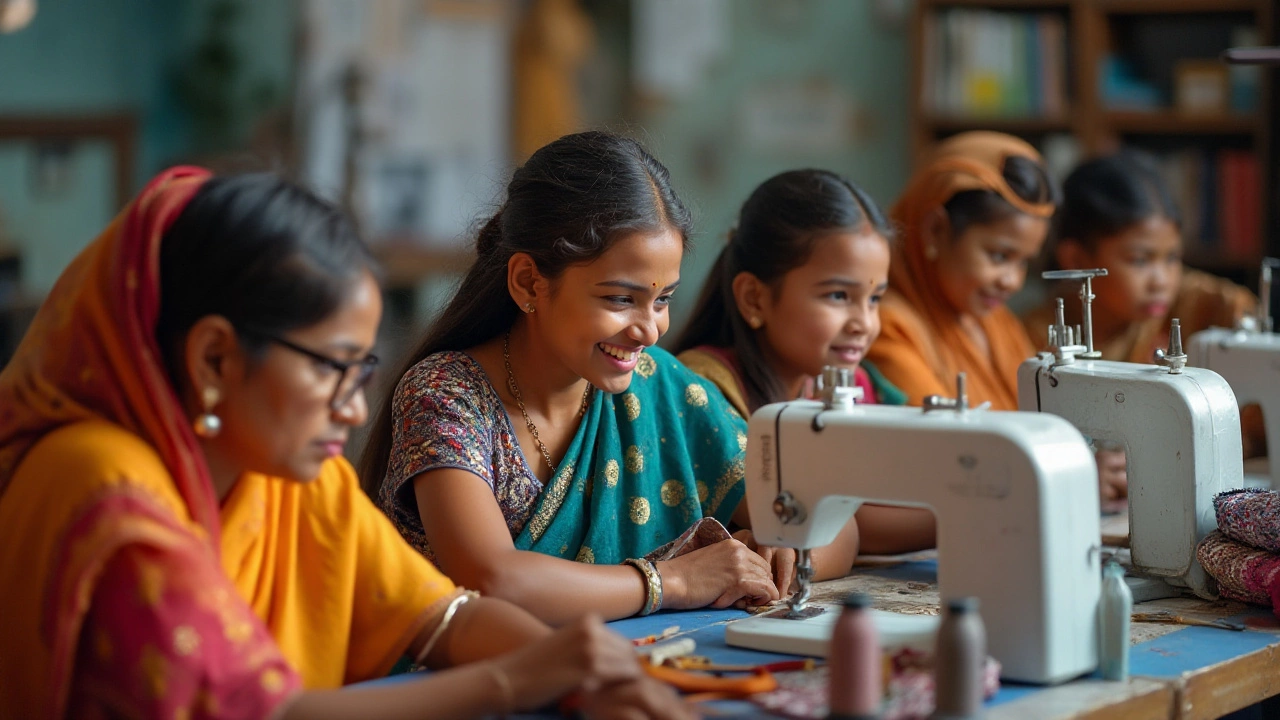Empowering Women Through Vocational Education: Inspiring Pathways to Equality

Vocational education has served as a beacon of opportunity, guiding many women toward independence and success. Its transformative impact can be traced back to pioneers who championed the belief that skill-based learning is a fundamental pathway to achieving equality. These visionaries understood that equipping women with practical skills not only empowers them individually but also fortifies communities and economies.
In our exploration, we'll delve into the rich history and the spirited individuals who have fueled this movement. We'll uncover the tangible benefits of vocational training and share heartening success stories of women who have carved niches in various industries. This journey also offers practical advice for those looking to unlock their potential through vocational education today. Through these insights, the enduring power of vocational education to nurture and propel women's equality becomes clear, echoing the belief that true equality is built on the foundation of empowering skills.
- The Historical Journey of Vocational Education for Women
- Influential Figures and Their Impact
- Benefits of Skill-Based Learning
- Success Stories: Women Who Thrived
- Practical Tips for Embracing Vocational Opportunities
The Historical Journey of Vocational Education for Women
The journey of vocational education for women is a profound saga of transformation, bridging the gaps in gender equality through skill and confidence. It was during the Industrial Revolution that the roots of vocational education as a tool for empowering women began to take hold. As societies shifted from agrarian economies to industrial powerhouses, the demand for skilled labor provided an unprecedented opportunity for women to step out of their traditional roles.
In the late 19th and early 20th centuries, Europe and the United States witnessed women venturing into new professional territories, thanks to the establishment of vocational schools aimed at female students. These institutions were the springboards for women to gain proficiency in trades such as nursing, teaching, and secretarial work, which were considered acceptable professions at the time. Nevertheless, these opportunities were met with both enthusiasm and skepticism as societal norms were still deeply entrenched in patriarchal views. Many educators ardently believed in the potential of these programs to create an equilibrium in professional realms.
One significant influence came from the efforts of Florence Nightingale, whose work in structuring nursing education offered women a respected avenue of vocational skills training. Nightingale is widely credited for transforming nursing into a profession embodying compassion and expertise. Her contributions highlighted the critical role of vocational training in enhancing healthcare and ensuring the participation of women in this vital industry. Her model set a benchmark, inspiring generations of women to pursue careers in fields demanding strong vocational foundations.
By the mid-20th century, vocational education had expanded further into fields such as home economics, which, despite its limitations by modern standards, represented an essential step in accommodating women's participation in vocational education. This period also saw the rise of technical schools, providing women with a broader curriculum encompassing manual skills and technical prowess. Another pivotal moment in this history was the establishment of the Women's Bureau in the United States under the Department of Labor in 1920. This bureau played a crucial role in advocating for fair labor standards and addressing the unique challenges faced by women in the workforce.
"Education is not preparation for life; education is life itself." – John Dewey. This philosophy resonated deeply within the realm of vocational training, championing an educational model where learning by doing was central. Women began to break into traditionally male-dominated fields, marking the beginning of significant societal changes. Though progress was slow, the seeds of vocational education for women were firmly planted, nurturing a future where gender no longer dictated one's potential.
Despite the strides made, it is vital to acknowledge the ongoing efforts required to bridge gaps that still exist today. Vocational education's historical journey showcases a resilient and evolving narrative, continually propelled by the tenacity and foresight of those who understood its power. This systemic change laid the groundwork for a more inclusive and equitable future, where women could pursue their passions unrestricted by societal expectations.
Influential Figures and Their Impact
The evolution of vocational education magnifies the contributions of remarkable individuals whose vision redefined educational paradigms for women. Among these trailblazers, Ellen Swallow Richards stands out as a pioneering force. Born in 1842, Richards became the first woman to be admitted to MIT and was instrumental in creating the first school of home economics. Her belief was unwavering; practical education could liberate women, cultivate their potential, and improve societal well-being. Richards' advocacy for integrating science and practical training into women's education laid a foundation for the modern vocational system.
Another iconic advocate was Booker T. Washington, a name synonymous with the fight for equal education. He firmly believed that access to skills training was crucial for uplifting marginalized communities, especially women of color. Washington founded the Tuskegee Institute, where the focus was not just on academic learning, but a comprehensive model that included agriculture, crafts, and science. This institution empowered many women to step beyond societal constraints and thrive in diverse fields.
Mary McLeod Bethune was another tremendous force, especially in America. As an educator and activist, she founded what would become the Bethune-Cookman University, emphasizing vocational education for women. Her motto was clear: education and work are the levers to uplift communities. Bethune's work inspired policies that integrated vocational training into mainstream education, amplifying its role in building women's self-reliance and community contributions.
Heading over to Britain, we see the influence of Millicent Fawcett. Known for her vigorous fight for women's rights, Fawcett also acknowledged the transformative power of educational empowerment. Her leadership in the suffrage movement went hand-in-hand with advocating for better vocational opportunities for women, understanding that true equality also requires economic independence. Her influence extended to reforms that opened doors for women in industries previously inaccessible to them.
Today, these luminaries' legacies continue to influence policies and inspire generations. Their collective vision highlighted an essential truth: vocational education is more than training; it is empowerment, a tool of equality, and a vehicle for individual and societal transformation. Through their efforts, many programs now emphasize inclusivity, ensuring women from all walks of life have access to quality education tailored to diverse talents and ambitions.

Benefits of Skill-Based Learning
Skill-based learning offers an array of advantages, making it vital in closing the gender gap and promoting women's equality. Primarily, it offers women the chance to acquire practical skills tailored to specific industries, transforming academic knowledge into applicable expertise. These courses provide flexibility, enabling women to learn at their own pace, often balancing other responsibilities like family life or previous employment. Many training programs are shorter than traditional academic pathways, allowing quicker entry into the workforce.
Moreover, such education is directly linked to real-world job markets. Sectors that were once perceived as male-dominated, such as construction, technology, or engineering, are now witnessing a rise in female participation due to improved access to skill-based programs. This shift not only enhances diversity within workplaces but fosters better team dynamics and innovation. A workforce that nurtures diversity inherently encourages a wider range of ideas, leading to breakthroughs in various domains.
Another noteworthy benefit is the economic empowerment it brings. Women with vocational training often command higher salaries upon entering the job market compared to their counterparts without such skills. A report from UNESCO noted that women with technical skills earn at least 20% more than those with only a secondary education. The impact extends beyond individual women to families and communities, creating a ripple effect that uplifts the socio-economic status of many.
In addition to economic benefits, vocational education improves personal confidence and independence. As women master new skills, they embark on journeys of self-discovery and empowerment. Confidence gained through skill acquisition often leads to stronger advocacy for oneself in varied professional scenarios. It's not uncommon for such confidence to translate into entrepreneurial ventures. Many women who undergo vocational training become business owners, driving innovation and job creation in their local communities.
One of the celebrated figures in the field remarked on the transformative power of vocational education in a speech some years ago.
"Education is the most powerful weapon which you can use to change the world," Nelson Mandela stated, reflecting on the importance of education, including skills training, in empowering individuals across all walks of life.
Let's not ignore the social benefits associated with women's skill-based learning. As more women enter trades and industries atypical for their gender, societal norms begin to shift. These shifts contribute to breaking down stereotypes and opening pathways for the next generation, ensuring young girls perceive a broader range of possibilities for their futures. Thus, vocational education stands as a pillar for not just skill development, but also social evolution.
To support further understanding, here's a quick glance at some statistical data illustrating the impact of vocational training on female employment rates:
| Field | Female Participation Increase | Average Salary Benefit |
|---|---|---|
| Technology | 35% | 25% increase |
| Construction | 20% | 15% increase |
| Manufacturing | 22% | 18% increase |
As these numbers reflect, the impact of vocational education is undeniably significant. It heralds a brighter future not only for women but for society as a whole, ensuring everyone has the opportunity to contribute their talents to the collective pool of human progress.
Success Stories: Women Who Thrived
The journey of women's equality through vocational education is adorned with numerous success stories, highlighting the real-world impact of skills training. One inspiring figure is Sarah Breedlove, better known as Madam C.J. Walker, who was born into poverty in Louisiana in 1867. Despite starting from humble beginnings, she became one of the first self-made female millionaires in America. Walker's foray into the business world began with a course in beauty and hair care, which empowered her to not only address her own needs but also create a thriving line of beauty products specifically for African American women. Her journey underscores the profound impact that vocational education can have, transforming not just individual lives but entire communities.
Across the ocean, in India, vocational training is bridging gaps and opening new vistas for women from diverse backgrounds. The SEWA Trade Facilitation Center (STFC) is a program that provides skills training to rural women artisans, enabling them to create exquisite handicrafts. The program offers these women a platform to sell their products on international markets, elevating their economic status and fostering community growth. One woman, Aarti Patel, became an internationally recognized artisan thanks to the skills and opportunities provided by STFC. Her story resonates with many, proving that skill-based learning can have hyperlocal and global impacts.
In the tech-savvy world of coding and programming, Reshma Saujani emerged as a beacon of empowerment by founding 'Girls Who Code', a non-profit organization that aims to support and increase the number of women in computer science. Her personal observations of gender disparity in tech inspired her to address the issue head-on through vocational training. Girls Who Code has now reached over 500,000 women across the globe, providing them with the crucial skills needed to thrive in the tech industry. Saujani's initiative highlights how targeted empowerment efforts can dismantle barriers and foster gender equality.
There's more than just anecdotal evidence supporting these stories. A report from the World Bank noted that women who engage in vocational training see on average a 15% increase in their earnings compared to those who don't participate. The tangible benefits reflected in such data offer a compelling argument for promoting vocational education worldwide. These stories and figures illustrate that vocational education is not a mere stepping stone, but a robust foundation for women's professional and personal growth. It's a journey of empowerment that has resulted in notable triumphs worldwide.
"Vocational education is not just about learning a trade; it’s about empowering oneself to create a future," said Gina Adams, a renowned advocate for women's education.

Practical Tips for Embracing Vocational Opportunities
In today's fast-paced world, seizing vocational opportunities can be a game-changer, especially for women seeking empowerment and equality in various fields. The journey begins with understanding that acquiring a specific skill set through vocational education can significantly enhance job prospects and open doors to new possibilities. For those contemplating this path, consider starting with comprehensive research to identify vocational programs that align with your interests and career goals. This foundational step is crucial in charting out a successful vocational journey. Make a list of industries where your chosen skills are in high demand, and tailor your educational pursuits accordingly.
One cannot underestimate the power of networking. Engaging with professionals in your desired field, either through social media platforms or industry events, can provide valuable insights and mentorship opportunities. These connections often guide you toward the most reputable training centers and courses that offer not only skills but also hands-on experience and field exposure. Don't shy away from reaching out to instructors or industry experts for advice as their practical insights can be invaluable. Consider enrolling in workshops and seminars, which can serve as a proving ground to test your skills while expanding your professional network.
Financial considerations can often pose a hurdle, but scholarships and grants for women's equality in education are more accessible than ever. Many institutions now offer financial aid specifically tailored for women pursuing skill-based training. It's worth investing time to explore these resources as they can substantially alleviate the burden of tuition fees. Creating a budget plan that accommodates unexpected expenses ensures a smoother educational journey. Moreover, part-time work or freelance projects relevant to your vocational field can provide both practical experience and financial support, bridging the gap between learning and full employment.
Once you have embarked on this educational path, continuous learning and skill refinement become paramount. The dynamic nature of today's job market demands that professionals keep abreast of emerging trends and technologies in their field. As you complete your training, consider internships or apprenticeships which offer real-world experience and often lead to long-term employment. Regularly updating your resume and online profiles with new skills and certifications reflects your commitment to growth and adaptability. Remember, as Helen Keller once aptly said,
"Optimism is the faith that leads to achievement. Nothing can be done without hope and confidence."This mindset is essential as you embrace and thrive in vocational education, carving out a path to both personal and professional success.

Post-Comment